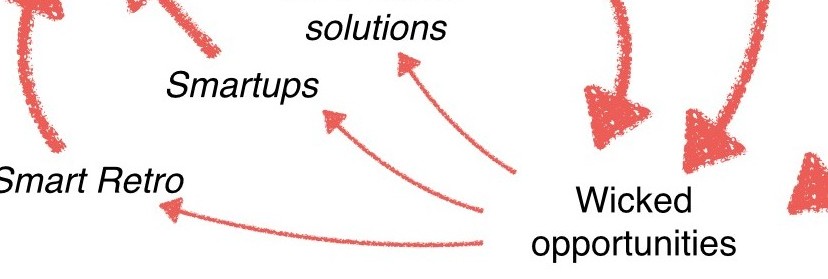
Demos Helsinki is going to Slush. To get an clue about the next big thing of cleantech and the Nordic way to scale impact and what’s the best pizza of the town like, don’t miss these parts of Slush 2014 official programme:
Slush Cleantech: Smartup manifesto, Roope Mokka at Green Stage, Tue 18th Nov at 2.15 pm
Demos Helsinki & Slush Impact pre-party at Putte’s bar & restaurant, Tue 18th Nov at 7 pm
Slush Impact: How to scale impact? The Nordic way, Maria Ritola at Green Stage, Wed 19th Nov at noon
Impact has always been a part of startup lingo. “We wanted flying cars, instead we got 140 characters”, boasts Paypal founder Peter Thiel. “Imagine a city that fosters community, where space isn’t wasted but shared with others”, visions Brian Chesky. “We are here to make a dent in the universe. Otherwise, why even be here?” was asked already by Steve Jobs.
Not until now this talk has started to turn into reality. Not in the form of flying cars, but making a change in the world by tackling humanity’s grand challenges. Some of the most valuable and interesting companies have started to focus on burning topics that drive change in societies throughout the world. These companies concentrate on topics such as smart cities as a solution to resource scarcity and climate change, communities and participation, healthcare and future of learning.
Traditionally, impact has been a source of motivation and action for pioneers in social enterprises and NGOs. Now the next wave of startups focusing on impact is emerging. These startups include Airbnb, Bla Bla car, Ajelo, Jiff, Heia Heia, Health Tap, Netmedi, Tribalearning, Creative Life, ESpark, and many others. They seek growth by providing solutions to some of the world’s most haunting problems.
This is happening for two reasons.
The first one is demand. Global problems such as growing population, access to education, health and sources of income, and peaking demand of natural resources are complex in nature. They are called wicked problems as there’s no one evident way to solve them. Instead, just like Fast Company wrote a while ago, there are infinite opportunities for different actors to leverage solutions for them.
These opportunities are already materializing in numbers. Healthcare market is growing with a speed of light and resource competition has already given birth to cleantech markets. Right now, peaking demand for natural resources is changing consumer markets. Cleantech companies have consequently started to offer new solutions enabling smart living and flexible transportation. By doing that these companies are disrupting big existing businesses. In the EU, people spend tens of thousands of euros on these activities on a yearly basis per person: a whopping third of income on housing and tenth on mobility. Compared to communications and entertainment where people spend about 10 % of their yearly income, markets are gigantic.
Even more important than demand is the supply, namely supply of talent. Value surveys indicate that young people want work that they feel is meaningful and in line with their values. This is a particularly strong trend in Finland. A survey of 1,770 students by Demos Helsinki in 2012 found that nearly 80% of young Finnish adults identified “meaningfulness” as an important or very important characteristic of a desirable workplace. This motivation has a unique impact on the Finnish startup scene featuring impact communities such as Peloton Club and University of Helsinki’s Think Company, as recognized in a recent article by Guardian.
The same motivation towards impact is visible at the Slush in many ways. It introduces some the most influential speakers and startups surely having their dent on the universe. If this caught your interest and you’d like to stay tuned, make sure you don’t miss Demos Helsinki and Slush Impact pre-party on Tuesday November 18th at 7pm!